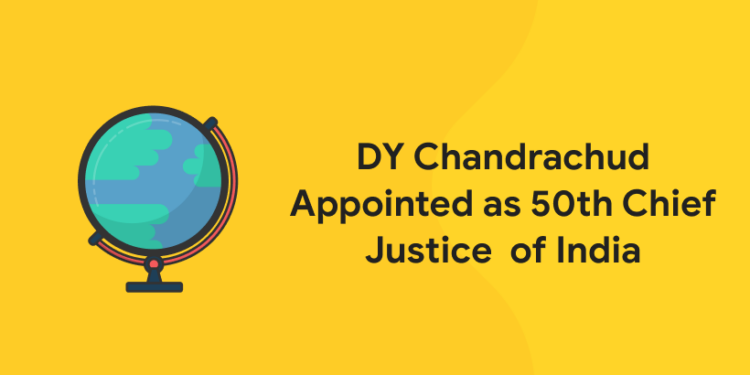Table of Contents
President Droupadi Murmu appointed Justice D.Y. Chandrachud as the 50th Chief Justice of India (CJI) on 19th October 2022. On 09th November 2022, the day following Justice Uday Umesh Lalit’s retirement at age 65, Justice Chandrachud will take the oath of office. Chandrachud will be the CJI for two years, while Justice Lalit has a brief 74-day term. He will demit office on November 10, 2024.
Who is Justice D.Y. Chandrachud?
Justice Chandrachud, presently the seniormost Supreme Court judge after Justice Lalit, was elevated to the Supreme Court on May 13, 2016. He served as the Chief Justice of the Allahabad High Court Court and a former judge of the Bombay High Court. Currently heads the National Legal Services Authority as executive chairman.
Justice D.Y. Chandrachud was born on 11 November 1959. He is the son of Justice Y. V. Chandrachud, the longest-serving Chief in India, and Prabha was a classical musician. He attended Cathedral and John Connon Schools in Mumbai and St. Columba Schools in Delhi and earned his degree in economics and mathematics with honors from St. Stephen’s College in Delhi in 1979. Later, in 1982, he earned a Bachelor of Law from the University of Delhi’s Faculty of Law, and in 1983, he graduated from Harvard Law School with a Master of Laws. He attended Harvard University while receiving the coveted Joseph H. Beale Prize, which is available to Indian citizens pursuing graduate studies overseas. He remained at Harvard to continue his doctoral studies in jurisprudence, which he did in 1986.
Notable Judgements of Justice D.Y. Chandrachud
1: Who was the first woman President of India?
- His lead judgment in Justice K. S. Puttaswamy (Retd.) and Anr. vs. Union of India and Ors., a unanimous nine-judge bench decision of the Indian Supreme Court, which established that the right to privacy is a right guaranteed by the Constitution, is one of his notable judgments. Chandrachud grounded the right to privacy in dignity, liberty, autonomy, bodily and mental integrity, self-determination, and across a spectrum of protected rights.
- He has written judgments protecting the freedom of speech in many various environments. In the case of Indibility Creative Pvt Ltd v. State of West Bengal, he was the author of the decision that fined the State of West Bengal and provided remedial compensation for using extra-constitutional means to prevent the screening of the political satire Bhobishyoter Bhoot. The Court had mandated that there be no restrictions on the movie’s showing in an interim injunction.
- He co-wrote the concurring judgment in the Indian Young Lawyers Association v. the State of Kerala, which declared that it was discriminatory and against women’s fundamental rights to prevent people of menstrual age from attending the Sabarimala temple. According to his Judgement, “the individual right to freedom of religion was not intended to prevail but was subject to the overarching constitutional postulates of equality, liberty, and personal freedoms recognized in the other sections of Part III.”
- In a recent ruling, he affirmed that sexual harassment at work violates the fundamental rights of women protected by the Indian Constitution. The judgment was based on a senior officer of the Punjab and Sind Bank’s complaint that she had been moved from Indore to Jabalpur as a response to her reporting fraud and corruption. According to the woman, a chief manager and Scale IV officer, her superior officer had likewise exposed her to sexual harassment.













